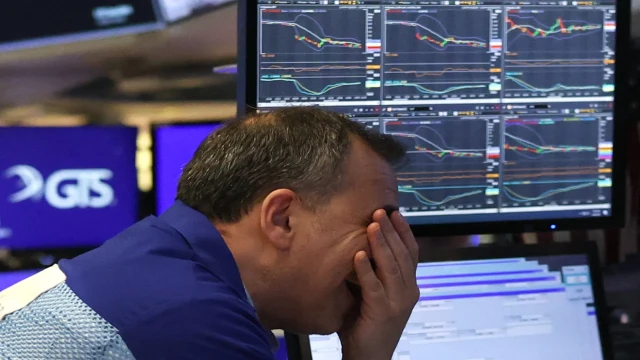United States, April 5 (V7N) – U.S. stocks closed sharply lower on Friday, with the blue-chip Dow Jones Industrial Average dropping more than 2,200 points, entering correction territory, and the tech-heavy Nasdaq falling into a bear market due to growing concerns over a trade war between the U.S. and China.
China’s commerce ministry announced it would impose a 34% tax on all U.S. products, matching President Donald Trump’s tariffs on Chinese goods. This retaliatory tariff, effective from April 10, was followed by China adding several U.S. companies to its "unreliable entities list" for allegedly violating market rules. China also opened an antitrust investigation into DuPont, causing its shares to fall by 12.75%.
Other countries, including the UK, Australia, and Italy, also held talks on the potential economic damage from the escalating tariffs.
This growing trade conflict raises the risk of a full-blown trade war, which could spark higher inflation and slow down global economies. J.P. Morgan now estimates a 60% chance of a U.S. recession in 2025.
Despite the grim economic outlook, Federal Reserve Chairman Jerome Powell remained cautious, stating that while tariffs will increase inflation and slow growth, the Fed would wait for more clarity before deciding on any interest rate changes.
Stock Market Impact
The Dow plunged 5.5%, or 2,231.07 points, closing at 38,314.86—its largest single-day drop since June 2020. The S&P 500 fell 5.97%, or 322.44 points, closing at 5,074.08, marking its worst week since the early days of the pandemic. The Nasdaq tumbled 5.82%, or 962.82 points, closing at 15,587.79, entering a bear market with a 20% decline from its peak.
These losses marked the sixth weekly drop for the S&P 500 and Nasdaq in the past seven weeks. The S&P 500 had its worst week since the start of the pandemic in 2020.
Jobs Report and Other Economic Indicators
Despite the market's downturn, the March jobs report showed better-than-expected results. Nonfarm payrolls increased by 228,000, up from the revised 117,000 in February, beating expectations. However, the unemployment rate inched up to 4.2%, slightly above expectations, marking the highest level since November 2021.
Although the labor market remains strong, the growing tariff concerns continue to weigh heavily on the economy.
Corporate and Sector Impact
Companies heavily exposed to China, such as Apple, saw their stocks fall sharply after China’s announcement of retaliatory tariffs. Apple’s shares dropped 7.29%, as about 80% of the company's production capacity is in China. Additionally, chip stocks also suffered, with President Trump indicating that tariffs could still apply to the semiconductor sector.
In other corporate news, DuPont experienced a significant drop in its stock price following the antitrust investigation by China. Meanwhile, Nissan reversed its decision to cut production in Tennessee, opting to maintain full production shifts to counter the impact of tariffs on vehicles imported from Mexico and Japan.
Global and Commodity Markets
Oil prices fell to their lowest levels since 2021, as fears of a recession dampened demand. The U.S. 10-year Treasury yield also dropped to 4.007%, signaling a flight to safer investments.
Bitcoin, which had its worst first-quarter performance since 2018, posted a modest recovery, gaining 0.92% to reach $83,915.98 amid the uncertainty surrounding tariffs.
Looking Ahead
As the trade war continues to escalate, experts remain uncertain about the long-term economic outlook. Mark Dowding, Chief Investment Officer at BlueBay estimates U.S. economic growth will slow to around 1% in the coming quarters due to global tariffs, with inflation rising to 5%. However, Bill Adams, Chief Economist at Comerica Bank, suggests that if the government reaches new trade deals and reduces tariffs, a recession could be avoided.
Despite the short-term volatility, many hope that global markets will adjust to the new tariff environment, though the long-term effects remain unclear.
END/WD/SMA/NYC/































Comment: